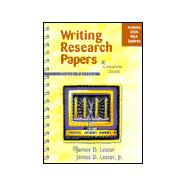
| Most chapters conclude with "Your Research Project." | |
| Preface to the Instructor | |
| Preface to the Student | |
| Writing from Research | |
| Why Do Research? | |
| Learning Format Variations | |
| Understanding a Research Assignment | |
| Understanding the Terminology | |
| Establishing a Schedule | |
| Finding a Topic | |
| Relating Your Personal Ideas to a Scholarly Problem | |
| Connecting Personal Experience to Scholarly Topics | |
| Speculating about Your Subject to Discover Ideas and to Focus on the Issues | |
| Talking with Others to Refine the Topic | |
| Personal Interviews | |
| Internet Discussion Groups | |
| Using the World Wide Web to Refine Your Topic | |
| Using an Internet Subject Directory | |
| Using an Internet Keyword Search | |
| Using the Library's Electronic Databases to Find and Narrow a Subject | |
| Using the Library's Electronic Book Catalogs to Find a Topic | |
| Expressing a Thesis Sentence, Enthymeme, or Hypothesis | |
| Your Research Project | |
| Drafting a Research Proposal | |
| The Short Proposal | |
| The Long Proposal | |
| Finding and Filtering Internet Sources | |
| Beginning an Internet Search | |
| Reading an Internet Address | |
| Using a Search Engine | |
| Subject Directory Search Engines | |
| Robot-Driven Search Engines | |
| Metasearch Engines | |
| Specialized Search Engines | |
| Educational Search Engines | |
| Educational Search Engines Maintained by Libraries | |
| Searching for Articles on Journals and Magazines | |
| Online Journals | |
| Online Magazines | |
| Searching for Articles in Newspapers and Media Sources | |
| Accessing eBooks | |
| Using Listserv, Usenet, and Chat Groups | |
| E-mail News Groups | |
| Real-time Chatting | |
| Examining Library Holdings via Internet Access | |
| Finding an Internet Bibliography | |
| Conducting Archival Research on the Internet | |
| Go to the Library | |
| Go to an Edited Search Engine | |
| Go to a Metasearch Engine | |
| Use Search Engine Directories | |
| Go to a Listserv or Usenet Group | |
| Go to Newspaper Archives | |
| Gathering Data in the Library | |
| Launching the Search | |
| Developing a Working Bibliography | |
| Finding Books on Your Topic | |
| Using Your Library's Electronic Book Catalog | |
| Using the Library's Printed Bibliographies | |
| Finding Articles in Magazines and Journals | |
| Searching the General Indexes to Periodicals | |
| Finding Indexes by Discipline in Appendix B | |
| Using the H. W. Wilson Indexes | |
| Searching for an Index to Abstracts | |
| Searching for Abstracts of Dissertations | |
| Searching for a Biography | |
| Searching for Articles in the Newspaper Indexes | |
| Searching the Indexes to Pamphlet Files | |
| Searching for Government Documents | |
| Searching for Essays within Books | |
| Using the Microforms | |
| Conducting Research Outside the Library | |
| Investigating Local Sources | |
| Interviewing Knowledgeable People | |
| Writing Letters and Corresponding by E-mail | |
| Reading Personal Papers | |
| Attending Lectures and Public Addresses | |
| Investigating Government Documents | |
| Examining Audiovisual Materials, Television, and Radio | |
| Conducting a Survey with a Questionnaire | |
| Conducting Experiments, Tests, and Observation | |
| Understanding and Avoiding Plagiarism | |
| Using Sources to Enhance Your Credibility | |
| Placing Your Work in Its Proper Context | |
| Honoring Property Rights | |
| Avoiding Plagiarism | |
| Common Knowledge Exceptions | |
| Borrowing from a Source Correctly | |
| Sharing Credit in Collaborative Projects | |
| Honoring and Crediting Sources in Online Classrooms | |
| Seeking Permission to Publish Material on Your Web Site | |
| Reading and Evaluating the Best Sources | |
| Finding the Best Source Materials | |
| Table of Contents provided by Publisher. All Rights Reserved. |
The New copy of this book will include any supplemental materials advertised. Please check the title of the book to determine if it should include any access cards, study guides, lab manuals, CDs, etc.
The Used, Rental and eBook copies of this book are not guaranteed to include any supplemental materials. Typically, only the book itself is included. This is true even if the title states it includes any access cards, study guides, lab manuals, CDs, etc.